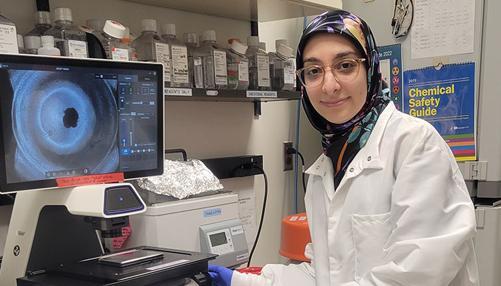Parinaz Fathi, Ph.D., an early career researcher at NIBIB, has already achieved a professional milestone─she leads an intramural research unit in the institute’s Section on Immunoengineering. The unit develops miniature organ models to study immune-related conditions and evaluates the role of biological nanoparticles in autoimmune diseases and cancer.

Fathi has run her Unit for Nanoengineering and Microphysiological Systems (UNEMPS) since 2022 when she became an NIH Independent Research Scholar (IRS), a non-tenure-track primary investigator. Researchers are selected for the program based on their readiness to conduct independent research and their commitment to enhancing diversity within the biomedical workforce.
“Being an independent researcher was something I had dreamt of for years. My selection for this position is a major step towards fulfilling that goal,” said Fathi.
The resources from the IRS program enabled Fathi’s group (she’s hired two post-baccalaureate scholars) to study autoimmune diseases and cancer from two perspectives: modeling certain organs, such as the thyroid, to better understand disease and studying extracellular vesicles (EVs), secreted biological nanoparticles that are used in communication between different cell types.
“My group is interested in EVs secreted by bacteria that alter the immune system and create disease states. We want to explore this mechanism, and eventually use that knowledge to develop therapeutic interventions. As part of this, we also develop organ models, with the goal of using them to study the EVs,” said Fathi.
Budding engineer
Fathi was interested in engineering from a young age, which her parents encouraged, having science and math backgrounds themselves. She participated in local science fairs and looked up to her older brother who obtained an engineering degree.
As an undergraduate student at the University of Maryland, she majored in mechanical engineering and minored in nanoscale science and technology. Taking classes in nanomaterials, microfluidics, and biomaterials led her to want to study nanoparticles further.
Her undergraduate lab experiences exposed her to bioengineering, a field she thought would be more rewarding than mechanical engineering. She switched to bioengineering for her graduate studies at the University of Illinois at Urbana-Champaign. “I liked that we could create technology that could improve people’s health and well-being,” she said.
Building her research career
She sought a variety of research opportunities early on, which exposed her to different senior researchers and mentors, and new ways of doing things.
She gained experience in research labs at the undergraduate and graduate institutions she attended and at federal health agencies. She completed an Oak Ridge Institute for Science and Education (ORISE) post-bac fellowship at the U.S. Food and Drug Administration (FDA), a graduate research fellowship for Science, Technology, Engineering, and Math (STEM) Diversity at the National Institute of Standards and Technology, and more recently an NIH post-doctoral intramural research fellowship in NIBIB’s Section on Immunoengineering.
Kaitlyn Sadtler, Ph.D., a tenure-track investigator who leads the section and mentors Fathi, said, “Parinaz came into our group right after COVID hit and had to focus on pandemic-related research rather than her research interests. She rose to the occasion and quickly became a respected member of the group for her advice on different research techniques and her organization in the lab was second to none. It was clear from the start that she was on an upward trajectory, and I wanted to support that,” said Sadtler, who nominated her for the independent researcher scholar position.
Rewards, challenges, and lessons learned
The rewarding aspect of Fathi’s research is knowing that it could lead to a better understanding of diseases and ultimately treatments that could improve people’s lives.
Conducting new research is both exciting and challenging because there’s no roadmap to follow, which leads to more trial and error, said Fathi.
When her experiments fail, she has learned to take it in stride. “I learn whatever I can from each experiment and use that knowledge to inform the next experiment. I have learned to separate my sense of self-worth from the success of experiments.”
She adopted the same mindset about papers she submits to journals. “When I received a rejection in graduate school, I would take it personally. Now, if I get a rejection, I think ‘where am I going to submit the paper next?’”
Her hobbies: STEM outreach and scientific art
Fathi is passionate about STEM outreach and increasing the participation of women and other under-represented groups in the biomedical workforce. She has volunteered at NIH in different roles; as a post-doctoral scholar, she was the intramural research program fellow representative in the NIH Working Group for Women in Biomedical Careers. Last summer, her intramural research unit hosted two interns participating in the NIH High School Scientific Training and Enrichment Program (HiSTEP). Fathi also plans to mentor diverse college graduates participating in the NIH Intramural Research Training Award program.

When she’s not volunteering, Fathi enjoys creating scientific art inspired by her research. Her images have been finalists or winners in art competitions or featured in art exhibits.
“These are typically by-products of lab experiments that I thought looked cool and wanted other people to see. I realized that many people don't get to see the beautiful things that we see as scientists. Also, scientific art can be a great way to communicate our science to the public and potentially interest them in our work,” said Fathi.
Since this article was published, Fathi was honored with making the Forbes Under 30 list for 2025 in Science.
